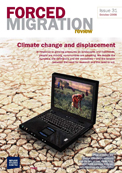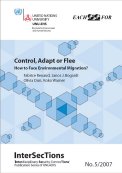Posted by Kayly Ober on June 3rd, 2010 | 
(The Transatlantic Dialogue on Climate Change and Security) June 3, 2010 – Foreign Policy’s Passport blog has a quick post, “Pacific islands are actually growing” linking to a new study from the University of Auckland saying that 80% of Pacific Islands have grown or stayed the same size of the last 60 years. The article in question, titled was published a couple of weeks ago in “Global and Planetary Change”.
According to the authors, Pacific Islands respond to rising sea levels (an average of 2 mm per year over these 60 years) by rising along with the sea. They do this by growing their coral reefs and capturing sediment. Tuvalu, a country widely expected to be the first to fall beneath the waves, has expanded in size over these 60 years, according to the study.
If only this meant that we don’t have to worry about entire nations
slipping beneath the waves anymore!
Unfortunately, there is evidence that we should not be complacent about this. Of the accelerating amount of carbon emissions being pumped into the atmosphere, about 50% of it is being captured by the oceans. A chemical reaction of the increased carbon with elements in the seawater is causing the oceans to become more acidic, and that acidity is killing coral reefs. So, we should not be so sanguine as to expect that what has worked to preserve these islands over the past 60 years of slow sea level rise will also work in
the forthcoming 60 years. We should also be aware that there is an increasing threat that sea level rise will be much faster than the 2 mm per year.
Last year, I blogged about the UN resolution, proposed by 12 Pacific island states, about the national security effects of climate change. The Maldives and Tuvalu have been at the center of international political action against climate change, and they have done good work. I worry that this study will be used by those opposed to climate action as a way to sideline them from the debate. I think they still have some persuasive arguments to make that they remain at risk. We shouldn’t stop sending the filmmakers, campaigners, and politicians to the Maldives or Tuvalu yet.
Cross-posted from The Transatlantic Dialogue on Climate Change and Security
Posted by Dan DaSilva on May 29th, 2010 | 
(International Organization for Migration) May 28, 2010 – Bangladesh – A year after Cyclone Aila, the last major cyclone to hit southwest Bangladesh, IOM and the BRAC Development Institute (BDI) have organized the country’s first policy dialogue on Environment, Climate Change and Migration.
The meeting, which was attended by government policy makers, representatives of civil society and donors, also saw the launch of a study commissioned by IOM from independent researcher Matthew Walsham: “Assessing the Evidence: Environment, Climate Change and Migration in Bangladesh.”
BDI launched a second study examining the links between climate change and urbanization in
Bangladesh.
The two studies show that climate change and natural disasters like cyclones have complex but tangible effects on patterns of migration. Over the long-term they result in migration from environmentally vulnerable regions. But both papers concede that there still is a dearth of studies on the nexus between climate change and displacement.
Continue reading this post »
Posted by Dan DaSilva on May 24th, 2010 | 
Here are a two links to new publications and an event thanks
to reader submissions.
The World Bank and the Agence Française de Développement, in partnership with the United Nations University EHS and the International Organisation for Migration are putting on the First Workshop on Climate Induced Migration in the Middle East and North Africa. It’s taking place in Marseille, France from June 15-16. The workshop will provide a forum for knowledge sharing of current research on climate induced migration and displacement carried out in the Middle East and North Africa region.
The Refugees Studies Centre at Oxford University released a new report Forced Migration Research and Policy: Overview of current trends and future directions. Section C
of this report covers the issue of environmental forced migration and includes recommendations on ways forward.
Lastly, the World Bank has come out with a new book, Social Dimensions of Climate Change: Equity and Vulnerability in a Warming World. Chapter 4: Climate Change and Migration: Emerging Patterns in the Developing World is worth checking out. The authors stress the politicization of development and relief is a critical need in understanding future challenges in the environmental security nexus.
Posted by Dan DaSilva on May 3rd, 2010 | 
“Hot Cities” is a powerful and informative documentary series that was aired last fall on BBC World News TV. This is an excellent eight-part series about the present effects of climate change on cities around the world.
Three of the episodes center around the issue of human mobility as a result of climate change at some depth, often following the lives of those who chose to abandon their farming livelihoods and move to nearby mega
cities in search of a better life.
I have embedded the first episode “Bursting at the Seams”, which examines Lagos – one of the fastest growing cities in the world. The other two are “Water, water, everywhere…” which explores the capital city of Dhaka in Bangladesh, and “Feed the World” which follows migrants from their drought stricken villages to the city of Dakar in Senegal. Each episode is about 45 minutes long. Click here to check out the other episodes in the series.
Source: BBC World News/rockhopper.tv
Posted by Dan DaSilva on May 1st, 2010 | 
(UN News Centre) April 30, 2010 – The head of the United Nations refugee agency has urged European Union (EU) members to serve as examples of the proper treatment of refugees and to forge a cohesive regional response to new forms of forced displacement, including population movement caused by the effects of climate change.
Speaking at the European Parliament in Brussels on Wednesday, António Guterres, UN High Commissioner for Refugees (UNHCR), said that in the 27-member EU, where internal borders have largely disappeared, people seeking protection should be able to find it.
He said that the number of refugees and internally displaced persons (IDPs) worldwide has remained relatively stable in recent years, as has the number of asylum applicants reaching industrialized countries. He attributed the trend to little change in the number of conflicts and the difficulty of ending them.
“Crises are either not solved or – once solved – quickly slip back into instability or even open war,” he said.
Mr. Guterres said that the number of refugees UNHCR was able to help to return to their homes last year fell to below 400,000, less than half the number of people helped to go back home in 2008.
Continue reading this post »
Posted by Dan DaSilva on April 21st, 2010 | 
 The American Security Project (ASP) is a non-profit, bipartisan public policy and research organization dedicated to fostering knowledge and understanding of a range of national security issues, promoting debate about the appropriate use of American power, and cultivating strategic responses to 21st century challenges. The American Security Project (ASP) is a non-profit, bipartisan public policy and research organization dedicated to fostering knowledge and understanding of a range of national security issues, promoting debate about the appropriate use of American power, and cultivating strategic responses to 21st century challenges.
They released a new report last week in their “Perspectives” publications section entitled “International Law and the Victims of Climate Change”. The report discusses the need to assist individuals impacted and displaced by climate change (IIDCCs). Authored by ASP Adjunct Policy Analyst Justin S. Rubin, the report details a four-part legal framework that must be enacted to provide support to IIDCC’s:
- a binding agreement between developed nations;
- a commitment by those nations to evacuate and resettle climate change victims;
- an adjudication method for deciding who needs to be relocated and to where individuals should be relocated;
- job and skill retraining for resettled IIDCCs.
While this proposed framework and its elements may seem like it is meant to empower wealthy nations over poor ones, the report clearly states that it is not. It is meant to reflect the responsibility and need for wealthy nations to play a significant role in relocating IIDCCs. The report emphasizes that if developed countries do not assist climate change’s victims, they will face
greater global instability and insecurity as well as likely be
blamed for climate change’s effects.
Click here to read the full report »
|
|




